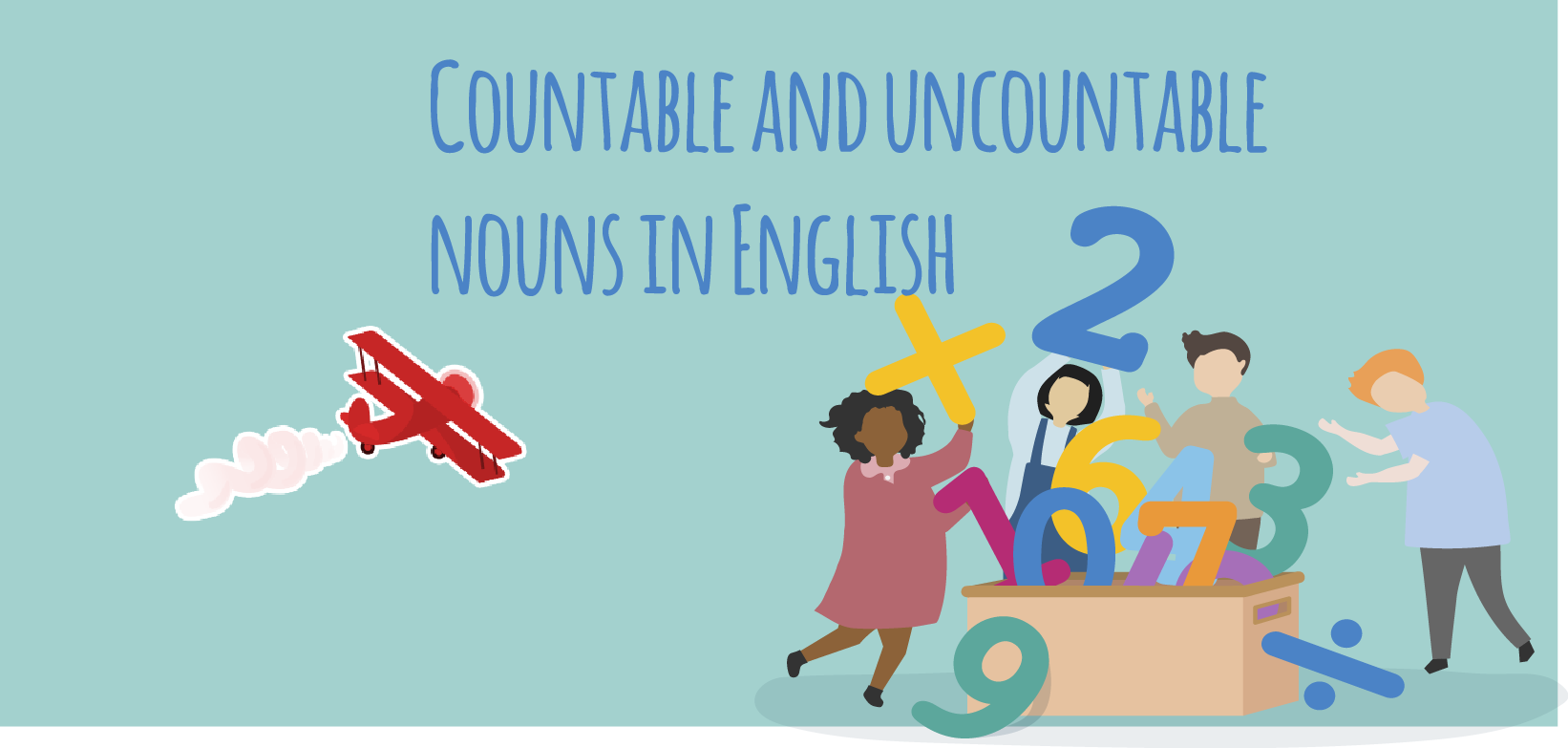Countable and uncountable nouns in English

Countable and uncountable nouns in English
INDEX OF CONTENTS
- Countable and uncountable nouns
- Uncountable nouns
- Summary
Nouns in English are words that designate fixed entities. They differ from other words such as adjectives (because these indicate characteristics and properties of nouns) and from verbs (which manifest actions).
In English grammar, countable nouns are individual people, animals, places, things, or ideas that can be counted. Uncountable nouns are not individual objects, so they cannot be counted. Here in this article we will take a look and show you the countable and uncountable nouns and provide you with examples of them. Although the concept may seem challenging, you will soon discover that these two different types of nouns are very easy to use.
Countable and uncountable nouns
It is important to know how to distinguish between countable and uncountable nouns in English because their use is different when it comes to both determiners and verbs.
Countable nouns
Countable nouns are for things that we can count using numbers. They have a singular and plural form. The singular form can use the determiner “a” or “an” . If you want to ask about the quantity of a countable noun, ask “How many?” combined with the countable plural noun.
Examples:
- She has three dogs (Tiene tres perros)
- I own a house (Soy dueño de una casa)
- I would like two books please (Quisiera dos libros por favor)
- How many friends do you have?( ¿Cuántos amigos tienes?)
Uncountable nouns
Uncountable nouns are for things that we cannot count with numbers . They can be the names of abstract ideas or qualities or of physical objects that are too small or too amorphous to be counted (liquids, powders, gases, etc.). Uncountable nouns are used with a singular verb. They generally do not have a plural form.
Examples
- Tea (té)
- Sugar (azúcar)
- Water (agua)
- Air (aire)
- Rice (arroz)
- Knowledge (conocimiento)
- Beauty (belleza)
- Anger (enfado
- Fear (temor)
- Love (amor)
- Money (dinero)
- Research (investigación)
- Safety (seguridad)
- Evidence (evidencia)
We cannot use a / an with these nouns. To express a quantity of an uncountable noun, use a word or expression such as some, a lot of, much, a bit of, a great deal of , or use an exact measurement such as a cup of , a bag of, 1 kg of, 1 liter of, a handful of, a pinch of, an hour of, a day of. If you want to ask about the quantity of an uncountable noun, ask “How much?” “How much?”
Examples :
- There has been a lot of research into the causes of this disease. / (Ha habido mucha investigación sobre las causas de esta enfermedad).
- He gave me a great deal of advice before my interview. / (Me dio muchos consejos antes de mi entrevista).
- Can you give me some information about uncountable nouns? / (¿Puedes darme alguna información sobre sustantivos incontables?)
- He did not have much sugar left. / (No le quedaba mucha azúcar)
- Measure 1 cup of water, 300g of flour, and 1 teaspoon of salt. / (Mide 1 taza de agua, 300 g de harina y 1 cucharadita de sal).
- How much rice do you want? / (¿Cuánto arroz quieres?)
Some nouns are countable in other languages but uncountable in English. Therefore you must follow the rules for uncountable nouns. The most common are:
- Accommodation / Alojamiento
- advice / consejo
- baggage / equipaje
- behavior / comportamiento
- bread / pan de molde
- furniture / mueble
- information / información
- luggage / equipaje
- news / noticias
- progress / progreso
- travel / viajar
Examples
- I would like to give you some advice. / (Me gustaría darte un consejo)
- How much bread should I bring? / (¿Cuánto pan debo traer?)
- I didn’t make much progress today. / (Hoy no progresé mucho)
- This looks like a lot of trouble to me. / (Esto me parece un gran problema)
- We did an hour of work yesterday. / (Nosotros hicimos una hora de trabajo ayer)
Be careful with the noun hair , which is normally uncountable in English , so it is not used in the plural. It can only be counted when referring to individual hairs.
Examples
- She has long blond hair. / (Ella tiene un largo cabello rubio)
- The child’s hair was curly./ (El cabello de la niña estaba rizado).
- I washed my hair yesterday / (Ayer me lavé el pelo)
- My father is getting a few grey hairs now. (refers to individual hairs) / (Mi padre ahora tiene algunas canas. (se refiere a pelos individuales)
- I found a hair in my soup! (refers to a single strand of hair) / (¡Encontré un pelo en mi sopa! (se refiere a una sola hebra de cabello)
Summary
To distinguish concrete from abstract nouns, a cardinal numeral adjective can be tried . If the phrase makes sense, it is a countable noun. For example:
- We have two bottles of water. (Tenemos dos botellas de agua). Botellas / bottles es un sustantivo contable.
- We have two waters. (Tenemos dos aguas). * This sentence is not correct. Agua (Water) is an uncountable noun.
However, it is important to note that there is no unbreakable rule, as uncountable nouns can be used figuratively. That is to say, uncountable nouns cannot be measured directly but is through a unit of measurement, which in this case is “bottle” (botella).
As always, to close the entry we leave you with the number 1 platform to obtain your official language title.


